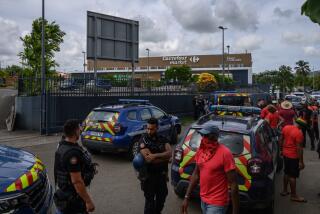6 Killed in Burma Rioting; Curfew Ordered in Capital
- Share via
BANGKOK, Thailand — Burmese authorities imposed a dusk-to-dawn curfew for the next two months in the capital of Rangoon after six people were killed and dozens injured in riots Tuesday, Burma’s state radio said.
Five police officers were killed and 26 injured by crowds wielding sticks and swords, it said. One rioter was killed and several others hurt, the broadcast, monitored in Bangkok, added.
The rioters burned down a police station, destroyed movie theaters and set fire to a police residential complex, the radio said.
“Serious action will be taken under existing laws against any individual found to be . . . gathering, making speeches, marching, instigating, encouraging, protesting, rioting and breaking the curfew”--6 p.m. to 6 a.m. until Aug. 19.
Western diplomats said it appeared to be one of the worst explosions of violence against strongman ruler Ne Win’s 26-year-old Socialist government.
The riots followed a week of peaceful student protests demanding the release of students jailed during March 12-18 riots in Rangoon, among the most severe to erupt in Burma since the early 1970s.
The government ordered the closure of several universities in Rangoon on Tuesday and told students whose homes were in the provinces to leave the capital.
Students marched into the city center Tuesday afternoon after handing out pamphlets and making speeches at the campus of the closed Rangoon University, Rangoon-based diplomats said.
The pamphlets denounced the “Burmese Nazi government” and demanded that the authorities account for students who were jailed or killed during the March disturbances.
Bangkok-based diplomats also said Ne Win’s former comrade-in-arms, retired Brig. Gen. Aung Gyi, was jailed last week after leaking critical letters he had sent to the Burmese leader.
His letters called on Ne Win to act against food shortages, human rights violations and corruption and to allow more freedom. They were furtively circulated in the capital, envoys said.
Aung Gyi was second in command after the military coup which brought Ne Win to power in 1962, but resigned the following year.
More to Read
Sign up for Essential California
The most important California stories and recommendations in your inbox every morning.
You may occasionally receive promotional content from the Los Angeles Times.









